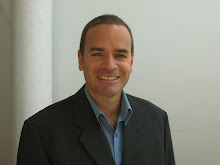What makes successful mission work?
I guess its a question most missionaries, mission agencies and mission supporters will find themselves asking at some stage. We're very early on in our time here in Mexico, but we're starting to think more about the shape of our ministry here, and of course the question of 'whether it will be successful or not' is coming up.
Fortunately we had a visit last week from a couple of wise and godly friends, and in the context of our meeting we read some of 1 Thessalonians - and as God would have it, there's a lot in there which helps answer this questions.
Here's a few quick thoughts about what Paul thinks (I think) makes a successful mission. (from 1 Thess 2)
Successful mission has happened when:
1. The gospel of God has been boldly declared. (v2)
Throughout Paul's mission trips in Acts and the letters he writes, there is no question that he wants to clearly and boldly declare the gospel of God - that is the reason he is there. Of course this sometimes brings him into conflict with the locals and therefore puts him in danger, but notice here that whether he gets beaten up or not isn't a mark of success or failure (if anything, it seems to be a mark of success!). Success is determined by the bold declaration.
2. The gospel declaration is pleasing to God, not men. (v4-5)
Successful mission happens when the desire to please God in what is said overturns the desire to please the human audience. Sometimes this will mean the suffering mentioned in v2 will happen, but you can hear Paul saying 'so be it.' Hollow promises are not make, untruths are not spoken, shallow and short term fixes are not proposed. The gospel is preached faithfully, fully and truthfully.
3. The missionaries don't look for glory (v6)
Because true ministry is God-glorifying, not self-glorifying, successful mission happens when the hearers give glory to God rather than rave on about how great the missionary is. It doesn't mean the missionary can't be appreciated, but it will change the motive for mission. Am I doing this to boost my own ego, or for the sake of the kingdom?
4. There is gentleness, caring, openness and a sharing of life (v7-8)
Successful mission happens not just in a one hour preaching spot or a week long intensive teaching class, but in the whole life of the missionary. In their home, over meals, in ongoing concern and love. With gentleness and compassion. For us here in Mexico as we struggle to learn Spanish, this is a very good motivation for us to keep going in our language work - it is very difficult to love people as a mother loves her children if you can't talk to them or understand their lives.
5. The conduct of the missionary is blameless (v10)
I have to admit this is a tough one, but it is true. Success is measured by the impact the gospel of God makes on the life of the missionary. If we as missionaries are not prepared to be challenged and transformed by the gospel, why do we think others should be?
6.An exhortation to a godly walk (v12)
Just as the missionary needs to live a godly life, so he or she needs to call on others to do so, afterall, the message of the gospel is a message that needs to be responded to in repentance and obedience. If we are not asking people to change, we're not faithfully preaching the gospel.
7. There is a response, and glory is given to God (v13)
The interesting thing about this survey is that the only 'result' so far is that of the life of the missionary himself. There is no mention of conversion numbers or the legacy that is left or anything like that. Success is much more about the way the missionary conducted himself and what he did.
In verse 13 there is talk of 'results' - but notice that the thanks and glory goes to God - so it is his success, rather than the missionaries.
The bottom line - if we're looking to be successful in mission, we need to look at ourselves, our methods and our motivations, rather than the numbers and spectacular stories (encouraging as sometimes they may be).



